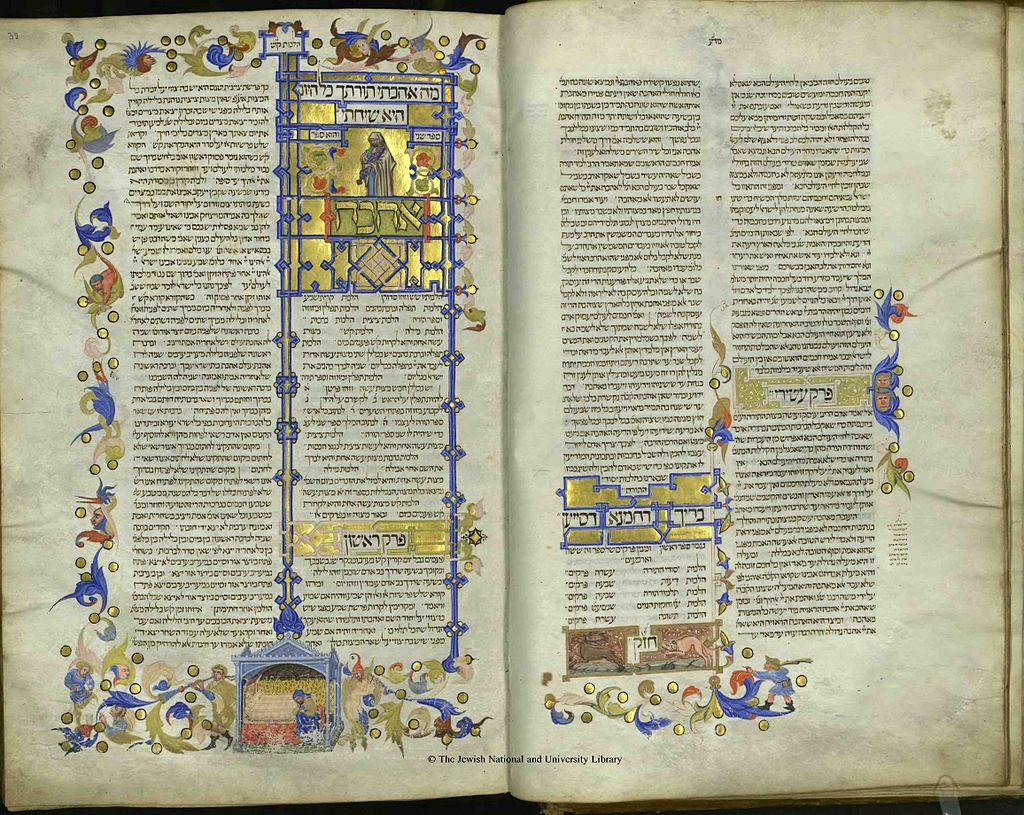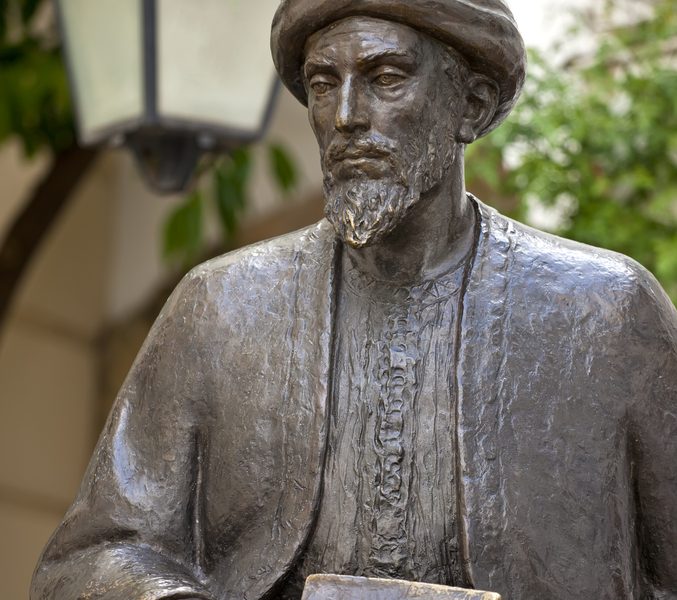
1170 AD to 1190 AD, Psalm 106: Maimonides.
This site was first built in French (see www.147thgeneration.net). The English translation was mainly done using « google translation ». We have tried to correct the result of this translation to avoid interpretation errors. However, it is likely that there are unsatisfactory translations, do not hesitate to communicate them to us for correction.
(for that click on this paragraph)
Summary
This generation of the 1170s and 1180s.
According to our count, this generation is the 106th generation associated with Psalm 106. It is in this Psalm 106 that we therefore find an illustration of the facts of this generation.
While the Almohad invasion plagues the end of the Muslim presence in Spain and therefore in Europe, the Western presence in the East is also suspended: the Christian kingdom of Jerusalem is threatened by Saladin who seizes it in 1187. This new situation in the East will be the trigger for the Third Crusade which will not succeed in restoring Christian domination in the East.
This generation closes the gestation announced to generation 90. Germany has already made its place in Europe, even if for centuries it will not appear as a great kingdom, its influence will be decisive. Christian Spain has already initiated the reconquest while Portugal is an independent kingdom since 1143. France and England come to close this generation the cast of actors who will play the European film during the generations that have yet to go for the Jews during their long exile. This fourth book began with Psalm 90 associated with generation 90.
Jews in future generations face the cultural renaissance that will make Europe the center of the world. This renaissance will in particular take as its pivot the emergence of the philosophical culture of Muslim Europe, which itself developed from the rediscovered Greek culture.
Avicenna, a Muslim philosopher, was the propagator of the works of Galen and Hippocrates, but it was especially the one that brought out the philosophy of Aristotle. Due to the rise of Muslim fundamentalism, his work will not allow the Arab world to become the intellectual power it could have become. This is not the case of the European Christian world following its example rediscovering the Greek culture, that of Esau, to become the dominant power of the centuries to come. The Jews in this passage of power, will play a determining role in the transmission of knowledge from the East to the West. But the emergence of Greek philosophical principles, from Plato to Aristotle endangers the theory of revelation and through it the creation of the world and as a consequence of the place of God in the Jewish intellectual world.
The solution to the dilemma is brought by Maimonides, who, like the Jews of his time, keeps trying to find his place in this world in the middle of a redefinition. Born in Córdoba in 1138, under the Almohad push, his family emigrated in 1151 to the Maghreb. This one also under Almohad domination, he emigrates again in Israel then in Egypt at the death of his father in 1170. Impregnated with Judaism by a long rabbinic ascendancy, he is also seduced by the Greek philosophy, in particular that of Aristotle, presumably influenced by Avicenna. One of these early masterpieces is the Mishne Torah (Repetition of the Torah) which he completed in 1180.
Maimonides will be far from unanimous in his own community in the following generations. However, his work has the advantage of opening up Judaism to the world and ensuring that it is not seriously challenged in the advance towards enlightenment.
In this generation, the warning signs of what will be the cohabitation of the Jews with the new Europe are emerging. Of the two emerging countries, France and England, which will eventually share the world, is born a new type of motive to attack the Jews: the accusation of ritual crime. This baseless accusation, through generations to come, will serve as an excuse to attack the Jews. It began in 1144 in England, but the point of no return is reached during this generation that sees the community of Blois decimated following a case of this type. On May 26, 1171, Thirty-three Jews lived in Blois at the time of the trial. Men, women and children (according to Riccardo Calimani, 34 men and 17 women were burned), were all burned at the stake. We would attend hundreds of such trials in the coming centuries. Thousands of Jews were going to be executed. The popes condemned these trials and executions, which did not cease.
Talk
The finalization of the gestation of Europe
This generation marks the end of a certain medieval world.
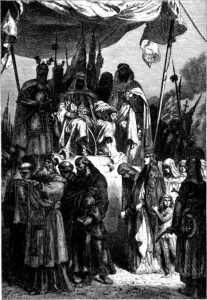
While the Almohad invasion plagues the end of the Muslim presence in Spain and therefore in Europe, the Western presence in the East is also suspended: the Christian kingdom of Jerusalem is threatened by Saladin who seizes it in 1187.
This new situation in the East will be the trigger for the Third Crusade which will not succeed in restoring Christian domination in the East.
At the same time, while Europe is losing its Eastern dreams, modern Europe is being built.
There was already the Spanish reconquest, already begun, and with it the general rise of European culture that permeates all the cultural accumulation of Islamic Spain before it sinks into Almohad fundamentalism.
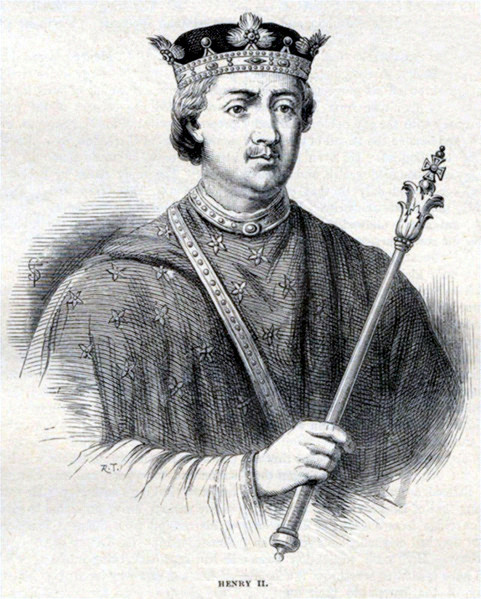
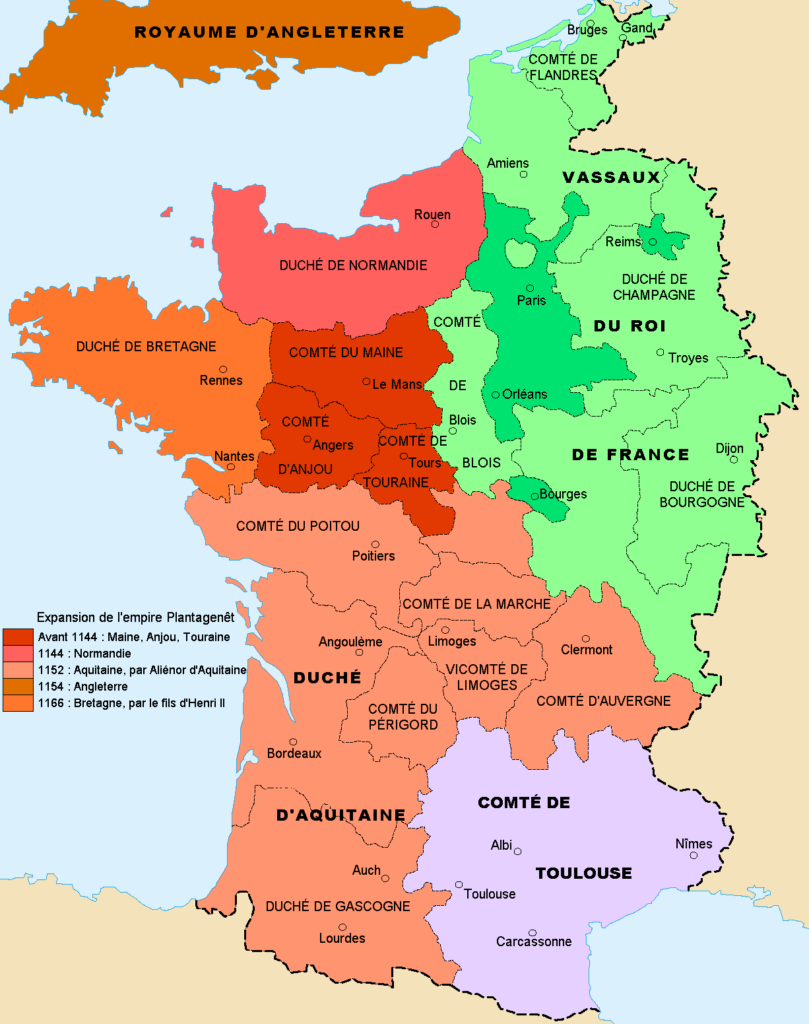
The Plantagenets reign over the Anglo-Norman kingdom for nearly three centuries. Henry II ensures the destinies for the generation that interests us. He began his reign in 1154, ending the succession struggle following the death of Henry I in 1135, death without direct heir. By marrying Aliénor of Aquitaine in 1152, he enlarged considerably his kingdom. Added to the English lands and Normandy Poitou, Aquitaine, Gascony, Limousin and Agenais.
The possessions of Aliénor and those of Henri together represent half of the kingdom of France. From then on, conflicts between France and England are frequent. Although tarnished in particular with the conflict with his son Richard Lionheart who will eventually succeed him in 1189, with the reign of Henry I, England emerges to take his place in the future great European nations. This great nation, which then has a large part of its territory in present-day France, comes up against the rise of another great European nation: Capetian France.
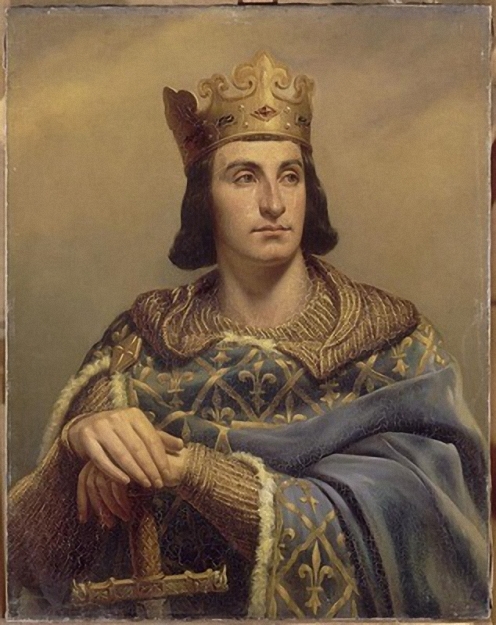
If the Capetian dynasty, initialized in 987, goes back to Hugues Capet, it is necessary to wait for the present generation so that this one provides with Philippe Auguste, a first king of France.
In fact the psalm of this generation closes the fourth book of psalms. This fourth book began at the 90th generation. We could then see that this generation, the 90th generation, and consequently the psalm of this generation marked the true beginning of the gestation of modern Europe. Recall what we said for the generation of Psalm 90:
- Like the previous generation (generation 89), this generation is a hinge generation. The break-up of the Carolingian Empire and the rebirth of the Byzantine Empire with its consequences on the emergence of the countries of Eastern Europe whose Slavic countries mark the blossoming of Europe. This outbreak of Europe will refocus the world. The ancient world was defined below a line materialized by Rome, Athens and Byzantium. The next world is defined above this line. The fourth book of Psalms corresponds to this shift in the world announcing for the Jewish people new destinies but also new misfortunes.
This generation closes this gestation announced to the generation 90, Germany has already made its place in Europe, even if for centuries it will not appear as a great kingdom, its influence will be decisive. Christian Spain has already initiated the reconquest while Portugal is an independent kingdom since 1143 (Treaty of Zamora concluded with the King of Spain Alfonso VII, following the victory over the Muslims in Ourique in 1139). France and England come to close this generation the cast of actors who will play the European film during the generations that have yet to go for the Jews during their long exile.
In this new Europe that will take the reins of the world for the last generations of exile, the Jews are largely represented by communities scattered in these new kingdoms, as shown in particular the cartography of French Judaism at that time.
Avicenna or the missed opportunity of the Islamic world
Jews in future generations are facing the cultural renaissance that will make Europe the center of the world. In particular, this revival will take center stage as the culmination of the philosophical culture of Muslim Europe which has itself developed from the rediscovered Greek culture.
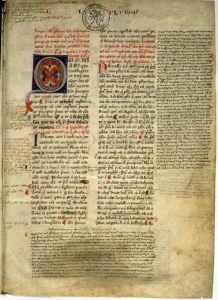
Avicenna, a Muslim philosopher, was the propagator of the works of Galen and Hippocrates, but it was especially the one that brought out the philosophy of Aristotle. Due to the rise of Muslim fundamentalism, his work will not allow the Arab world to become the intellectual power it could have become.
This is not the case of the European Christian world following its example rediscovering the Greek culture, that of Esau, to become the dominant power of the centuries to come. The Jews in this passage of power, will play a determining role in the transmission of knowledge from the East to the West. But the emergence of Greek philosophical principles, from Plato to Aristotle endangers the theory of revelation and through it the creation of the world and as a consequence of the place of God in the Jewish intellectual world.
From this confrontation between the world of Esau and Isaac, there is the problem of the place of the Jews for future generations. The pure and simple rejection of Greek ideas would shatter Judaism into obscurantism, in the image of what is happening in the Muslim world. The indiscriminate adherence to Greek ideas would be a death sentence for Judaism, a final victory of Esau over Isaac.
Maimonides, key to the confrontation between Judaism and modernism
The solution to the dilemma is brought by Maimonides, who, like the Jews of his time, keeps trying to find his place in this world in the middle of a redefinition. Born in Córdoba in 1138, under the Almohad push, his family emigrated in 1151 to the Maghreb. This one also under Almohad domination, he emigrates again in Israel then in Egypt at the death of his father in 1170. Impregnated with Judaism by a long rabbinic ascendancy, he is also seduced by the Greek philosophy, in particular that of Aristotle, presumably influenced by Avicenna. One of these early masterpieces is the Mishne Torah (Repetition of the Torah) which he completed in 1180.
If in this book he addresses himself to all Jews, he does not take long to address the « elite » to try to remove the apparent contradictions between Judaism and modernism, between Judaism and philosophical thought.
This is the goal of « The Guide of the Perplexed » that he finishes in 1190:
- The guide [1] was written for one who is bothered by the anthropomorphisms that affect God in the scriptures. This book is therefore made for the « intellectuals » imbued with secular sciences and troubled by the apparent opposition between their prophetic knowledge and their religious beliefs. And to the question that they are forced to ask themselves – whether religion and philosophy tend toward the same goal – Maimonides answers in the affirmative. […]
- Mishne Torah, on the other hand, pursues a purpose opposite to that of the Guide. Destined for the masses, it offers them a series of concrete rules that are almost exclusively a practical philosophy.
Maimonides will be far from unanimous within his own community in the generations that will follow. His work has the advantage of opening up Judaism to the world and to ensure that it is not challenged seriously in the progress towards the Enlightenment:
- In [2] the medieval Jewish thought the appearance of Maimonides marks a real turning point: before him the philosophical exegesis, or the allegorical commentary of the Scriptures, took its first steps. After the publication of the « The Guide for the Perplexed », we are witnessing a powerful development of this type of exegesis. No one has synthesized so clearly the cardinal doctrines of Judaism to try to bring them closer to the teaching of the Stagirite philosopher (Aristotle).
The beginning of the psalm of this generation pays tribute to the approach of Maimonides, in the tradition of those who preceded him as Ibn Ezra or Ibn Daoud, who despite their attraction to modernity and science remain faithful to the Mosaic law by reaffirming the primacy of God over the universe, its creation and consequently on the eternal validity of the Mosaic law in the respect of the mutual right:

- Hallelujah. Give thanks to the Lord for He is good, for His kindness is forever.
- Who can narrate the mighty deeds of the Lord? [Who] can make heard all His praise?
- Fortunate are those who keep justice, who perform righteousness at all times.
- Remember me, O Lord, when You favor Your people; be mindful of me with Your salvation.
- To see the goodness of Your chosen ones, to rejoice with the joy of Your nation, to boast with Your inheritance.
But this vivacity of Judaism, exemplary in its fidelity to the divine covenant, can not make us forget that the people of Israel are in exile. This exile will soon attack its last phase, the most terrible.
The worrying warning signs of Jewish cohabitation in Europe
During this last phase, Jews will both benefit from an unprecedented cultural dynamism in contact with the new Europe, but at the same time suffer unprecedented misfortunes in their confrontation with Esau’s heirs, at least intellectuals.
That is why, before attacking, this last phase, the psalmist recalls the faults of the Jewish people in the desert that are the cause of this exile:

- We sinned with our forefathers; we committed iniquity and wickedness.
- Our forefathers in Egypt did not understand Your wonders; they did not remember Your manifold deeds of kindness, and they were rebellious by the sea, by the Sea of Reeds.
- And He saved them for His name’s sake, to make known His might.
- And He rebuked the Sea of Reeds, and it dried up, and He led them in the depths as [in] a desert.
- He saved them from the hand of the enemy, and He redeemed them from the hand of the foe.
- And the water covered their adversaries; not one of them survived.
- And they believed His words; they sang His praise.
- Quickly, they forgot His deeds; they did not await His counsel.
- They craved a lust in the desert, and they tried God in the wasteland.
- He gave them their request, but He sent emaciation into their soul.
- They angered Moses in the camp, Aaron, the holy man of the Lord.
- The earth opened up and swallowed Dathan and covered the congregation of Abiram.
- And fire burned in their congregation; a flame burned the wicked.
- They made a calf in Horeb and prostrated themselves to a molten image.
- They exchanged their glory for the likeness of an ox eating grass.
- They forgot God, their Savior, Who wrought great deeds in Egypt.
- Wonders in the land of Ham, awesome deeds by the Sea of Reeds.
- He intended to destroy them [and would have] were it not that Moses, His chosen one, stood before Him in the breech to return His wrath from destroying.
- They rejected the desirable land; they did not believe His word.
- They complained in their tents; they did not hearken to the voice of the Lord.
- He raised His hand to them to cast them down in the desert,
- And to cast their seed among the nations and to scatter them in the lands.
- They became attached to Baal Pe’or and ate sacrifices of the dead.
- They provoked [God] with their deeds, and a plague broke out among them.
- Phinehas stood up and executed justice, and the plague was stopped.
- It was accounted for him as a merit, for generation to generation to eternity.
- They provoked [God] by the waters of Meribah, and Moses suffered because of them.
- For they rebelled against His spirit, and He uttered with His lips.
What the psalmist has just summarized is a reminder of the three basic faults of the Israelites in the desert: the waters of Meribah, the golden calf and the fault of the explorers.
Each of them should have resulted in the extermination of the Jewish people in the desert. But thanks, mainly through Moses, these exterminations were canceled and replaced by three sets of forty-nine generations of curses.
This reminder is made at the right time, the Jews have already gone through more than a hundred generations where they have already suffered many and severe curses. But this generation closes the fourth book of Psalms and announces the fifth and final which is associated with the last generations of exile of the Jewish people, those for which the nations will increase their exactions and their hatred towards the Jewish people.
The passage of this psalm therefore reminds us that exile is not over and that it is entering its hardest phase.
This generation is showing early signs of what will be the Jewish coexistence with the new Europe.
If the previous passage of the psalm evokes fire (« And fire burned in their congregation; a flame burned the wicked.« ), it is not unrelated to the events of this generation, and what it announces for the future .
Indeed, Europe will use fire as a « purifying » element against the impiety represented in their dogma by the Jewish presence. For this generation, but unfortunately also many times in what remains of exile, including in « modern » times.
Of the two emerging countries, France and England, which will eventually share the world, is born a new type of motive to attack the Jews: the accusation of ritual crime. This baseless accusation, through generations to come, will serve as an excuse to attack the Jews. So much so that, against all odds, Muslim propaganda in its fight against Zionism and the Jews in general is still clinging to it in a completely irrational way.
It began in 1144 in England, but the point of no return is reached during this generation that sees the community of Blois decimated following a case of this type:
- In 1171 [3], a new fear took over Christianity already in the grip of demons. The Jews of Blois were accused of practicing ritual murders. People who had a deep repulsion for pagan sacrifices and who, since the Bible period, forbade themselves to consume the blood of meat, were now accused of killing a Christian to take blood and make unleavened bread of the Passover. The Jews, they whispered, were not human and needed the strength of the blood to take human form. The first Christians had also been victims of the same accusations, as were the heretics within Christianity. This was the first trial of its kind in France. The very first in history had taken place a few decades earlier in Norwich in England in 1144. Thirty-three Jews lived in Blois at the time of the trial, men, women and children (according to Riccardo Calimani they are 34 men and 17 women who were burned). On May 26, 1171, they were all burned at the stake. We would attend hundreds of such trials in the coming centuries. Thousands of Jews were going to be executed. The popes condemned these trials and executions, which did not cease.
The accusations against the Jews are obviously wrong and often a real crime is concealed by these attacks. But if the Jews of this generation obviously do not sacrifice innocent blood for their sacrament, it has not been the same for the generation of the golden calf.
Resuming this episode of the desert, the psalm of this generation finds a way to evoke the accusations against the Jews of Blois:

- They did not destroy the peoples whom the Lord had told them [to destroy].
- And they mingled with the nations and learned their deeds.
- They worshipped their idols, which became a snare for them.
- They slaughtered their sons and daughters to the demons.
- They shed innocent blood, the blood of their sons and daughters whom they slaughtered to the idols of Canaan, and the land became polluted with the blood.
- And they became unclean through their deeds, and they went astray with their acts.
Without taking the defense of the nations oppressing the Jewish people, the continuation of the psalm recalls that it is because of the faults in the desert that Israel is at the mercy of the nations in a long exile which will soon reach its final phase:

- And the Lord’s wrath was kindled against His people and He detested His inheritance.
- And He delivered them into the hands of nations, and their enemies ruled over them.
- And their foes oppressed them, and they were humbled under their hand.
But if the Jewish people is condemned to be mistreated by the nations, God remains vigilant not to abandon it completely so that at the end of his exile, he can regain his privileged place because of the divine covenant.
This is what the conclusion of the Psalm expresses:

- Many times He saved them, but they were rebellious with their counsel, and they were humbled because of their iniquity.
- But He looked upon their distress when He heard their cries.
- And He remembered His covenant for them, and He relented in accordance with His abundant kindness.
- And He caused them to be pitied by all their captors.
- Save us, O Lord, our God, and gather us from the nations, to give thanks to Your holy name, to boast with Your praise.
- Blessed be the Lord God of Israel from world to world, and all the people shall say, « Amen. » Hallelujah!

[1] Maurice-Ruben Hayoun: « The Enlightenment of Cordoba in Berlin ». Chapter: « The Biblical Exegesis of Saadia Gaon to Moses Maimonides ». (French: « Les Lumières de Cordoue à Berlin ». Chapitre : « L’exégèse biblique de Saadia Gaon à Moïse Maïmonide ». (p. 176) ).
[2] Maurice-Ruben Hayoun: « The Enlightenment of Cordoba in Berlin ». Chapter: « The Biblical Exegesis of Saadia Gaon to Moses Maimonides ». (French: « Les Lumières de Cordoue à Berlin ». Chapitre : « L’exégèse biblique de Saadia Gaon à Moïse Maïmonide ». (p. 166) =.
[3] Chaim Potok: « A story of the Jewish people ». Chapter: « Christianity: Lost in the Enchanted Country ». (French: « Une histoire du peuple Juif ». Chapitre : « Le Christianisme : perdus dans le pays enchanté »

